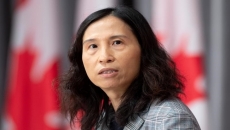The debates are behind them, the key clips cut and posted online, the emails trumpeting victory issued to supporters.
Now the four candidates running to be the next leader of the federal Conservatives have two months left to convince thousands of party members they are the best person for the job.
Ballots will go in the mail in July and must be back at the party's headquarters by Aug. 21. A winner will be announced shortly after.
"This contest still has a long way to go," Peter MacKay said.
A running theme in the English debate Thursday had been how Leslyn Lewis, Erin O'Toole, Derek Sloan, and MacKay, intend to grow the party's support enough to win a coveted majority government in the next federal election, but also respect and include the party's longtime faithful.
One sign of their progress on that front will be revealed in the coming days when the membership numbers for the party are released.
In the 2017 leadership campaign, the candidates added about 100,000 new members to the rolls for a total of 259,000 potential voters.
Only 141,000 actually cast a ballot.
Among them were some of the most motivated of the grassroots, social conservatives — a faction currently lining up behind Lewis and Sloan.
Sloan suggested during the debate that by expanding that particular base, the party can win more seats in coveted ridings made up of new Canadians.
He pointed out that in Ontario, the Progressive Conservative government of Doug Ford won when it opposed a new sex ed curriculum.
"Social conservative issues are policy that affect family, seniors and children and we can't be afraid to address values," Sloan said.
O'Toole has argued he is best placed to broaden the party's appeal in crucial suburban ridings by pointing to his own electoral record: he has won his riding of Durham, on the outskirts of Toronto, three times.
Visible minorities make up 13 per cent of the population in O'Toole's riding, and immigrants count for just 15 per cent.
By contrast, the ridings the Tories most covet to form a majority are made up by 50 to 70 per cent visible minorities.
Building a country — and a party — that is more inclusive means taking action on systemic racism, MacKay said during the debates.
"We have to address these issues in meaningful ways," he said.
"The discussions are important, the listening is more important than ever before."
The issue is top of mind for many in Canada, with protests in recent days right across the country in support of Black and Indigenous communities. At a protest in Ottawa June 5, Prime Minister Justin Trudeau dropped down to one knee with the protesters, a symbolic gesture of solidarity.
But Lewis, the first Black woman to run for leadership of the party, said it was just that, symbolism.
"He's the prime minister, he has an ability to make substantive changes," she said. "If he wants to do something about making this country a better place, he can do it."
When asked whether he believes systemic racism exists, or how he would define it, O'Toole didn't provide a specific answer.
"You could define it to me," he said in response to a question from a reporter after the debate.
"I've said, whenever we see an instance of racism, zero tolerance."
O'Toole said Conservatives want people to succeed no matter their skin colour or where they come from.
MacKay, who served as justice minister in the last Conservative government, ducked a question after the debate about whether he bore any responsibility for the ongoing problem.
During his time in that position, the Conservatives increased mandatory minimum sentences for many crimes.
While Black and Indigenous people are over-represented in federal custody compared to their share of the population, a 2017 study by the Justice Department also concluded that between 2007 and 2017, they were also much more likely to be in prison for an offence that had a mandatory minimum penalty.






